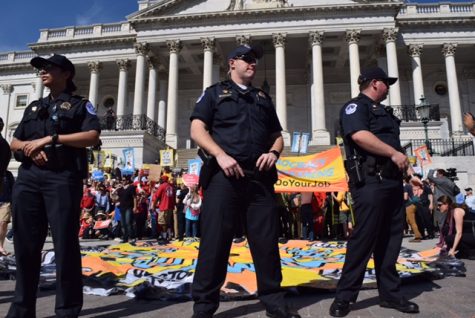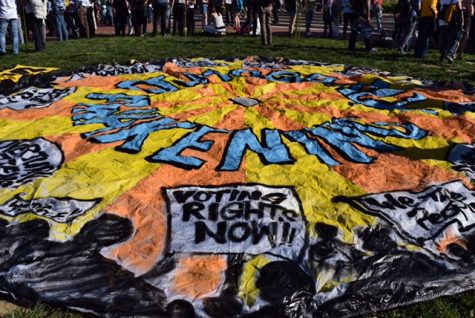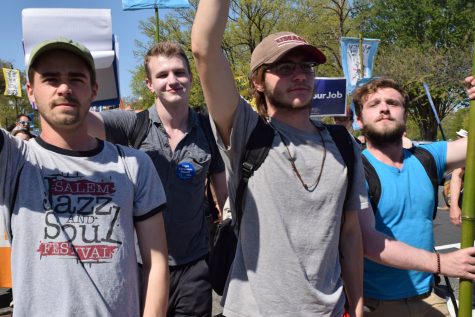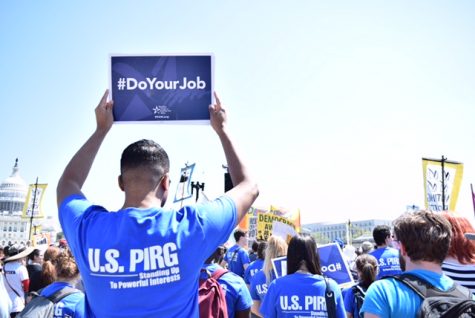Coming together to awaken a new democracy
April 21, 2016
Washington, D.C.- A motley crew of 32 activists, from University of Massachusetts Amherst students to local Vietnam War veterans, headed toward the nation’s capital on April 16 for Democracy Awakening, a protest that brought thousands of activists together to fight for voters’ rights issues, take big money out of politics and demand a democracy that works for everyone. The weekend offered demonstrations that included workshops, rallies, marches, and nonviolent direct action training and implementation.
An outsider would never believe the quiet bus from UMass was actually full of activists who planned to march Capitol Hill and risk arrest in the name of democracy.
Action began early Monday, April 18 with a kickoff rally in front of Union Square that brought thousands holding signs promptly to the Capitol Building. Sweat dripped down protestors’ faces, not just from the heat of the day, but also from the intense emotion they felt on their way to “fight for what’s right.”
“This is what democracy looks like,” a man in an orange jumpsuit with a chain wrapped around his neck chanted, pushing police lines and protesters. The crowd repeated the call throughout the marches and while demonstrators were being arrested in front of the U.S. Capitol Building.
Police responded calmly but firmly to this direct action. They had seen it before, time and time again, and especially recently over the past week with similar movements. The peace was both withheld and disrupted — protesters made their point clear but also conducted themselves as responsible citizens.

Over 300 people were arrested at the rally this past weekend for a total of 1,400 arrests, including those from Democracy Spring, a similar movement held on April 11-16. Recognizable public figures like Ben & Jerry’s ice cream cofounders, Ben Cohen and Jerry Greenfield, were arrested, among others.
“At a certain point, you have to say enough is enough. I have decided to risk arrest because we can’t continue to have a political system where ordinary people are shut out of the process. It’s not what our founders envisioned, and it’s not what democracy is supposed to be about,” Greenfield said in a press release on the movement’s website.
The group of leaders that spoke at the rallies for the medley of causes is yet another example of people coming together to move toward the first step in finding solutions for their specialized issues, such as climate change, racial justice, health care, immigration reform and peace.
Hilary Shelton, senior vice president for advocacy and policy for the Washington, D.C. chapter of the NAACP said in an interview on Saturday that the union of different issue groups is what allows the movement to be successful.
“We have what I call a convergence in interests — people coming from different perspectives and different experiences have the same vision of the future for themselves and their families, but may have to go about a different way to do it,” he said. “Recognizing the coalition is our most effective tool.”
He explained the notion of privilege and certain groups not understanding the strife of others, not necessarily because they ignore it, but because they simply haven’t experienced it or been able to understand it. Acknowledging and welcoming diversity in people and ideas helps make the movement relatable and understandable to a much wider group of people.
Unity certainly was the theme of the weekend, reflected in the ways very different communities came together to fight for the first steps toward separate goals. People were tossing out stereotypes, judgements, and misconceptions they had of other people, groups, or issues and coming together in a learning community of activists and friends.
 “We’re angry about a lot of stuff,” Pamela Goodwin, 68, a retired civics teacher from Upton, Mass. chimed in during a conversation with UMass students. “That’s why we’re here.”
“We’re angry about a lot of stuff,” Pamela Goodwin, 68, a retired civics teacher from Upton, Mass. chimed in during a conversation with UMass students. “That’s why we’re here.”
UMass freshman Ben Baldi praised how the movement was not about one single issue, but the culmination of all issues present in underrepresented communities.
“There’s many people here from all sorts of backgrounds,” he said. “I think the unifying thing for everyone is frustration among the people.”
Baldi explained that he, like many others, was tired of simply talking about the issues that plagued communities across the nation with no progress or results.
“I came here because I know change is only possible from the bottom up. This is the keystone to bottom-up democracy,” he said. “I came here to be a part of it, not just talk about it.”
Baldi decided not to risk arrest in non-violent direct action this weekend because he was arrested and put on probation this past week from the Divest UMass sit-ins at the Whitmore Administration Building.
Baldi said he expected to find like-minded people who were hopeless about the future. His expectations were blown out of the water when he found a diverse and passionate group of people fighting for the first step in a long string of success and failures towards their specialized goals.
UMass freshman Alexander Walsh, a friend of Baldi, said he felt that changes that needed to be made within the government were “painfully obvious.”
“I came here because I didn’t know what to expect,” he said. “I wanted to see what was going on with the people trying to create change.”
 Walsh was impressed by the different people and groups that came together to build coalitions to be the voice of change for a common first step, as opposed to individual groups seeking out attention for themselves.
Walsh was impressed by the different people and groups that came together to build coalitions to be the voice of change for a common first step, as opposed to individual groups seeking out attention for themselves.
“The voice of many carries further than many voices,” he explained.
Another UMass freshman, Emmett Madeson, made the journey to fight for what’s “not right” in the government and the world. As a genderqueer person identifying with they/them pronouns, Madeson was upset by the way they and their community were treated by institutions, especially at UMass, despite its notably liberal community of students and people living in the area.
“I wanted to be there to experience this,” they said. “It’s going to be big and really exciting.”
Madeson has been an activist since they were in ninth grade.
“I was still a baby in my opinions then,” they said. “But I still knew that something wasn’t right and I didn’t like it, so I found ways to fix it.”
They agreed with Baldi and Walsh about the diversity of the group.
“It’s really cool seeing how multi-generational it is,” they said. “It’s not just us (college students).”
But Madeson felt that today’s protesters, though uniting in similar ways, are not as extreme as in previous generations.
“People don’t want to risk as much now as they did then,” they said, citing examples of the number of arrests and bodily harm at large demonstrations before and during their mother’s time.
Ernie Tremblay, 73, of Westfield, Mass. proved himself to be fragile in age, but strong with passion. He was as excited and eager to participate in the movement as the bright-eyed young students that surrounded him. He was set on getting arrested for the cause.
“We gotta keep making it difficult for them (the government) so they understand,” he said proudly. “I hope it’s a little chaotic just so they know we’re here.”
While it would have been his first arrest, this demonstration was not his first. This Vietnam War veteran started his career as an activist when he returned from the war.
“I never want to see that again,” he said quietly. “We have to fight not to go to war.”

UMass junior Belief Gratini was eager to experience his first direct action as an activist since joining MassPIRG.
“This is the first time I’ve felt personally concerned about any political decisions,” Gratini said. “I realized we have never really had a democracy in this country. It’s important to always give leaders a show of what we care about. I understand that sometimes it can be difficult to gauge public opinions on certain issues.”
When asked how he will make the change he wishes to see, he replied “Simply being a presence.”
Gratini hopes to provide support to those “taking a bigger risk” by being arrested and making a point for those who couldn’t make it to Washington, D.C.
After being asked how the rally would benefit him on a personal level, he promptly replied:
“Being there.”
Morgan can be reached at [email protected].
